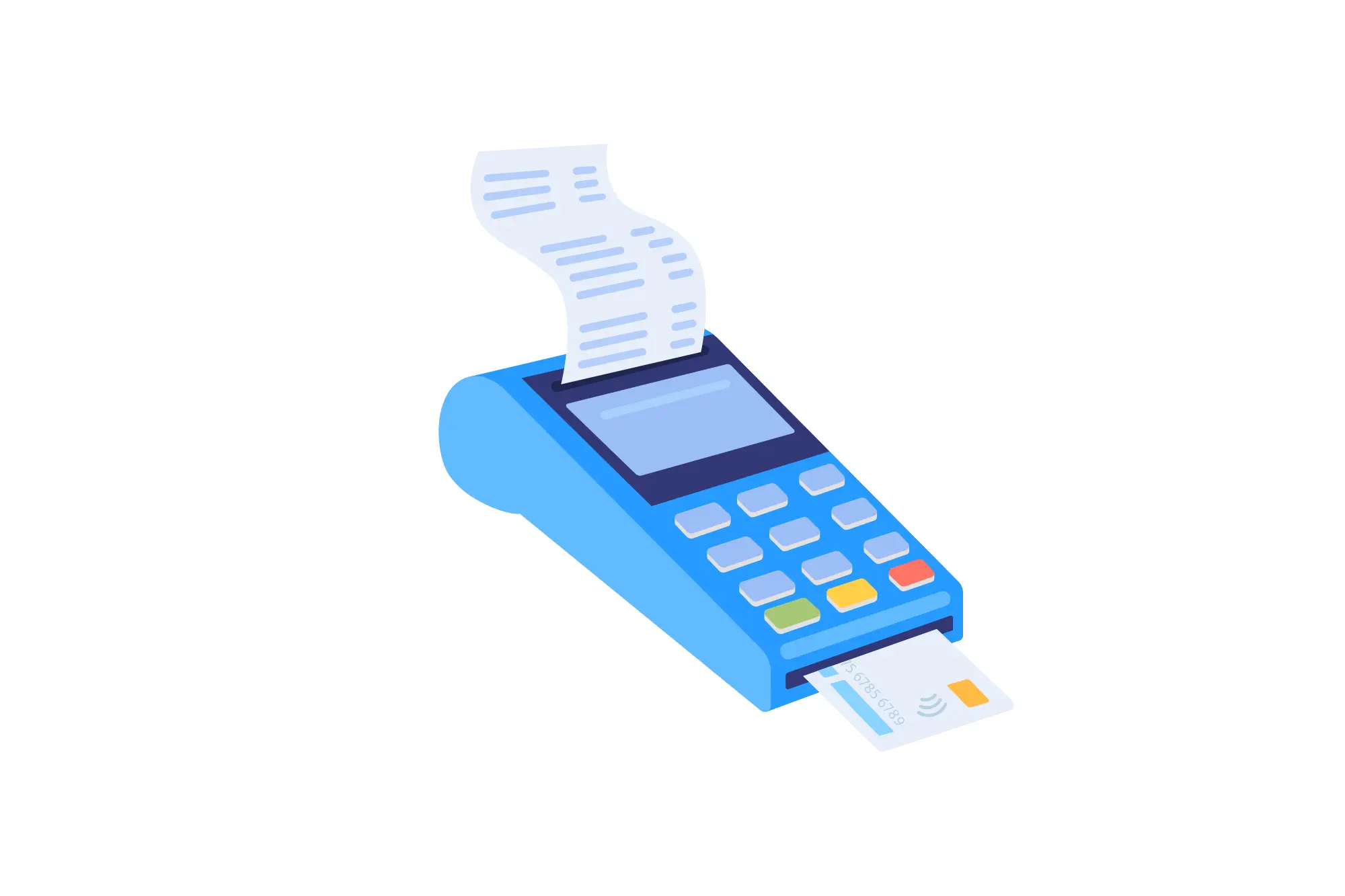TABLE OF CONTENTS
- What Is a Third-Party Payment Processor?
- How Does Third-Party Payment Processing Work?
- Examples & Types of Third-Party Payment Processors
- Advantages of a Third-Party Payment Processor
- Disadvantages of a Third-Party Payment Processor
- Third-Party Payment Providers vs. Merchant Accounts
- What to Consider When Choosing a Third-Party Payment Processor
- Is Third-Party Payment Processing Right For My Business?
While third-party payment processors are seldom talked about, they are directly related to card payments in our society. Offering card payments to your customers can make their shopping experience much more enjoyable. In fact, whether it’s dining, buying groceries, or heading to a concert, recent research suggests at least 75% of consumers prefer to use a credit or debit card over any other form of payment.[1]Business Wire. “Consumers Prefer Cards to Pay, Choices Differ by Age, Shows Fiserv Research“. Accessed May 24, 2023. However, accessing credit card processing isn’t always easy, especially for merchants starting a business or operating in high-risk industries.
Fortunately, in recent years, many payment options have opened up to businesses of all sizes in the United States. One option is third-party payment processing to accept payments quickly and bypass the need to open a merchant account. Nonetheless, third-party credit card processors come with drawbacks like additional fees, sub-par customer support, and minimal security.
This guide explores everything you need to know about third-party payment processors—how they work, how they compare to merchant service providers, and more. Let’s figure out if third-party payment processing is right for your business!
What Is a Third-Party Payment Processor?

A third-party payment processor, or a payment service provider, enables merchants to accept credit and debit cards. Businesses favor this payment service for many reasons. For one, its quick onboarding process allows sellers to start taking payments instantly. Additionally, the underwriting procedure associated with third-party credit card processors is relatively lenient compared to traditional merchant accounts. Third-party payment processors are a convenient choice for merchants.
How Does Third-Party Payment Processing Work?
Instead of issuing individual merchant accounts to clients, third-party payment processors utilize aggregate merchant accounts. An aggregate merchant account is a bank account that is shared by multiple merchants to process payments. For example, after a payment is processed, the third-party payment processor will deduct fees from the transaction and transfer the remaining balance from the aggregate merchant account to the merchant’s business bank account.
While this sounds complicated, in practice it doesn’t impact the accuracy of the payments you receive. However, third-party credit card processing often results in longer wait times before your business will receive funds. This is because payments must go through the aggregate account first.
With third-party payment processors in control of the merchant account, there is less transparency regarding the core fees you’ll pay. They typically add their own fees on top of traditional processing fees, making your statements more confusing to understand. At first, it may seem like you’re paying a straightforward processing fee, but the costs will eventually be pricier than with a traditional merchant account.
Additionally, as third-party payment processors handle the backend of each transaction, they offer a hands-off approach to merchants. This is perfect for business owners who don’t want to involve themselves in the intricacies of the process.
Examples & Types of Third-Party Payment Processors
Now that you understand how third-party payment processing works for businesses, it’s time to explore some examples:
Square
Square provides easy-to-use payment processing software and hardware to clients throughout the United States. The Silicon Valley startup offers mobile card scanners, POS software, and other tools for processing all kinds of payments. Square also developed the peer-to-peer payment platform, Cash App, which offers a similar product to PayPal’s digital wallet.
PayPal
PayPal brought digital wallets to the mainstream. While this platform is best known for its peer-to-peer money transfers, it’s now used by millions of merchants worldwide. PayPal recently acquired iZettle, a point-of-sale payment processing business, that introduced them to the in-person payments industry. The company now offers a variety of in-person and online services to merchants in the United States and worldwide.
Stripe
Unlike many third-party payment processors, Stripe‘s strength lies in its customization options. This is extremely beneficial for businesses with an in-house development team willing to build their payment platform online. However, they aren’t an easy-to-use third-party processor if you don’t have web development experience.
Stax
Stax is another all-in-one payment solution making it convenient for new business owners to access payment processing solutions. They offer invoicing, eCommerce tools, in-person payments, keyed payments, contactless payments, and mobile payments. The company also provides enterprise solutions to businesses that process large volume amounts each month.
SumUp
SumUp is a London-based third-party processor now offering payment services to United States merchants. With a decade of experience under its belt, SumUp has managed to obtain many small business merchants here in the U.S. with limited transaction histories.
Advantages of a Third-Party Payment Processor
If you’re assessing several processing options for your business, it’s critical to understand the advantages of third-party payment processors.
Low cost
Third-party payment processors typically involve minimal startup costs. Many of them provide access to portable card readers and smartphone POS apps, making it affordable to begin accepting payments quickly.
Flexible contracts
There aren’t lengthy contracts with many third-party payment processors, meaning your business can change to a new processor without incurring hefty fees. Likewise, many third-party credit card processors have multi-tier contract options, making it easier for businesses of all sizes to find a plan suitable to their needs.
Cheaper to use in the short-term
While there’s no doubt traditional merchant accounts offer lower fees in the long term, third-party processors are an affordable option in the short term. Why is this the case? Mainly because they have minimal setup costs and no lengthy contracts, meaning that they are a more accessible option for businesses without significant startup capital.
No requirements
Lastly, while applying for a merchant account often includes a lengthy underwriting process, this isn’t true for third-party payment processors. Many third-party credit card processors allow you to sign up instantly, making them an excellent choice if you need to quickly begin accepting payments.
However, this isn’t always a good thing. For example, since you’ll be instantly approved, the processor could find an issue with your business down the line, after underwriting your account. This could lead to an account freeze or even termination. Additionally, you will still be subject to user agreements, and avoiding chargebacks and disputes will remain extremely important.
Disadvantages of a Third-Party Payment Processor
While third-party payment processors offer benefits to certain merchants, there are also some downsides. Let’s explore the disadvantages of working with these processors below:
Minimal security flexibility
Credit card fraud is now responsible for more than $25b in annual losses worldwide, making it a hotbed for criminal activity.[2] MoneyTransfers. “15 Shocking Credit Card Fraud Statistics & Facts for 2022“. Accessed May 24, 2023. Sadly, the cost of credit card fraud often falls on the merchant, therefore, if you’re processing credit card transactions, figuring out the right security protection is highly important.
Unfortunately, with third-party payment processors, your business is at the mercy of its security protocols. While some of these processors take security features seriously, others are lacking in this department. Since you won’t be able to customize your specific security features with a third-party payment processor, this can lead to exposed risk for your business.
More fees on average
While many third-party payment processors don’t require significant upfront payment or investments, you may find that their fees are more expensive than average credit card processing fees. Why is this the case? Since they offer quick, easy access to payments, there’s a cost for this convenience.
On the other hand, merchant accounts offer more payment flexibility and transparency, but they are harder to acquire. Many merchant service providers will work with your small business to get your account approved and negotiate better pricing for you. This is all possible because it’s a much more personalized experience than using a third-party credit card processor.
No priority
Unfortunately, when you partner with a third-party payment processor, you won’t be a top priority. Most of these processors experience high client turnover rates, as their primary concern is attaining as many clients as possible, regardless of their churn rate.
This isn’t the greatest news for merchants, as it means that their concerns or issues may not be taken seriously or prioritized. So, you won’t find much loyalty in third-party processors if you’re looking for a partner that is committed to your business’s future.
Lack of branding control
If you want your business’s online checkout experience to integrate entirely with your branding, third-party payment processors have limitations. Unfortunately, many of them use their own branding on their payment gateways and tools. This means that you won’t be able to use your logos, color schemes, or branding elements on your site.
While this isn’t a dealbreaker for many businesses, it’s worth considering. If you want your website to retain complete control over its payment solutions, third-party payment processors aren’t a suitable choice.
No integration flexibility
With so many software tools available to modern businesses, it’s always a good idea to partner with a processor offering full-scale payment integration with other platforms. However, many third-party processors are restrictive regarding integration flexibility and they only integrate with certain platforms. This makes it challenging to merge with other software products and can hamper other areas of your business. Some examples include payment gateways, loyalty programs, and accounting tracking.
Sub-par customer support
Lastly, third-party payment processors have a reputation for providing sub-par customer support. As account freezes are prevalent with third-party processing, their customer support systems are often overrun. This can be very frustrating if you are in a situation where you are unable to process payments and you can’t speak to a live person to resolve your issue.
Third-Party Payment Providers vs. Merchant Accounts
As a modern business owner in the United States, you have countless choices when it comes to payment processing. Many platforms are in competition to provide merchant services to your business. One of the best alternatives to a third-party payment processor is a merchant account. Let’s explore how third-party payment providers compare to merchant account providers from different perspectives:
Control and stability
With a traditional merchant account, your business will possess greater control and stability within its payment space. Additionally, third-party payment processors often hold funds and freeze accounts without notice, causing major issues for businesses that need access to cash flow. Likewise, third-party payment processors often make it challenging to unfreeze accounts, which can leave your business unable to process payments.
While merchant accounts can also experience fraud or excessive chargebacks, these issues occur much less. It only takes a few minutes of browsing online to see how many PayPal and Square customers complain about account freezes and similar issues.
Application
If an easy, stress-free payment processing application is a top priority for your business, third-party processors could be a suitable choice for you. There is less due diligence involved in applying for one, as the processor does not need to provide your business with an individual merchant account. High-risk merchants often struggle to attain payment processing from third-party processors, as they tend to avoid businesses operating in risky industries.
However, there are some merchant account providers that specialize in high-risk businesses and are happy to approve these business types. Although the application process is longer for merchant accounts, it can be a more stable option for your business. Once you are approved, the processing bank isn’t likely to shut your account down, as they are already familiar with the ins and outs of your business.
Ease-of-use
Since third-party payment processors are a one-stop shop, they are often easier to manage for new business owners. Many third-party processors offer hardware, software, eCommerce solutions, and more, making it easy to access all the tools your business needs in one single location. Likewise, they typically charge flat rates, making it easier to predict your processing costs. As mentioned before, this also comes with less room for negotiating lower rates for your business.
Scalability
If you’re like most business owners, you want your business to continue to grow. In terms of scalability, traditional merchant accounts are significantly adaptable. Not only do they have the capacity to handle large increases in payment volumes, but their per-transaction costs tend to decrease as payment volume grows. If you don’t take advantage of lower processing rates as your business’s revenue increases, it can negatively impact your bottom line.
However, some third-party payment processing firms offer “enterprise” solutions for businesses with large processing volumes. While you will need to contact the processor directly to discuss their enterprise rates, it’s worthwhile if your business processes more than $500,000 annually.
Access to funds
Lastly, in terms of access to funds, a traditional merchant account is undoubtedly the superior option. With third-party payment processors, your funds are routed through a merchant account that is shared by numerous merchants. This can make it hard to contact a live customer service representative when you have questions. Opposingly, with a traditional merchant account, you’ll have exclusive rights to your account and a dedicated account representative assigned to you.
Third-party processors may take days or weeks to send you money from your transactions, making it hard to maintain cash flow. With a merchant account, you’ll be able to access funds more quickly so that you can turn a profit faster.
What to Consider When Choosing a Third-Party Payment Processor
If your business decides to use a third-party payment processor, it’s essential to choose the most suitable option. Let’s explore the various factors to consider when comparing them:
Hardware & software integrations
First, it’s time to explore the software and hardware integrations available through your third-party payment processor. Choosing one that offers access to other leading platforms will make it easier to get the most from your business’s payment system. Potential hardware integration examples include:
- Cash drawers
- Card readers
- Card terminals
- Printers
- Scanners
- Tablets/Computers
In terms of software, consider the following options:
- Point-of-sale software
- Loyalty program software
- Sales tracking software
- Accounting software
- Online booking software
- eCommerce software
Costs & fees
As with any service your business uses, the cost of payment processing is a contributing factor in making a decision. While processing fees seem small on paper, they can add up quickly, especially with large volume transactions.
While traditional in-person card processing fees are critical to consider, it’s wise to also explore the cost of other types of transactions. For example, card-not-present (CNP) transactions, international transactions, and more. It’s also worth considering the chargeback fees, return fees, and other fees involved as they may impact your business’s bottom line.
Supported payment types
Next, it’s beneficial to identify the payment options available with each third-party payment processor. Don’t partner with payment processors that aren’t compatible with all major credit cards—your business must offer complete convenience to your customers. Payment flexibility ensures that you won’t miss out on a sale!
Policies & procedures
Your payment processor’s policies and procedures will significantly influence your experience as a merchant. Make sure to read merchant agreements before making any commitments. Avoiding third-party processors that issue hefty penalty fees for product returns or refunds is crucial.
One of the main policies to consider is their chargeback policy. Chargebacks, which occur when a customer disputes a charge and requests a refund, can result in fees, lost revenue, and the suspension of your payment processing capabilities. So if your processor has high chargeback fees, it can get expensive for you down the line. It’s also important to note that third-party payment processors typically don’t have chargeback protection programs, as they cater to lower-risk businesses.
Customer Support
Lastly, never overlook the importance of customer support. It’s critical to partner with a third-party payment processor offering around-the-clock support, especially if you own a business operating outside regular business hours. Having readily available assistance is crucial to resolving payment system issues.
Is Third-Party Payment Processing Right For My Business?

If your business is in the market for a payment processor, consider your business history and industry type before making a decision.
While third-party payment processors are accessible, easy-to-use, and come with a range of integrations, they are often more expensive and less transparent than many merchant account options. As businesses grow, many business owners switch to traditional merchant accounts, which are cheaper and more secure in the long run. So if you can access a merchant account when you first start your business, doing so can help you avoid the headaches associated with rigid third-party processors.
Additionally, merchant accounts come with special solutions tailored to your ever-changing business needs, so you won’t get shut down unexpectedly. They offer more stability, ease of use, and excellent customer support so that you can process credit card payments successfully.





